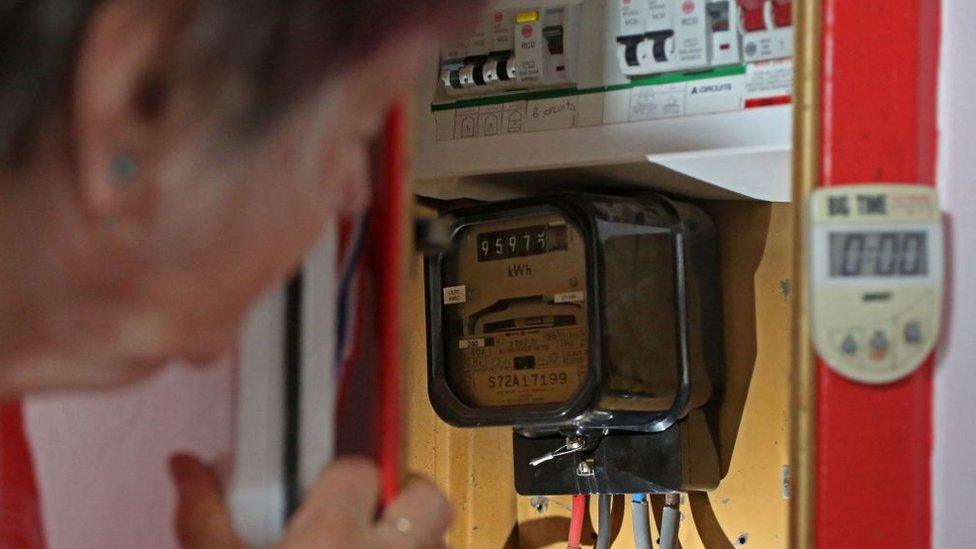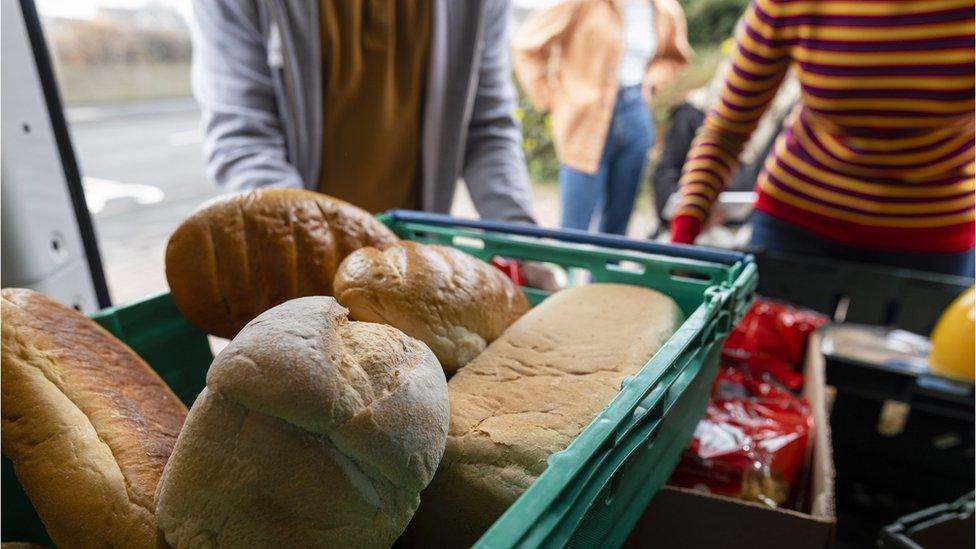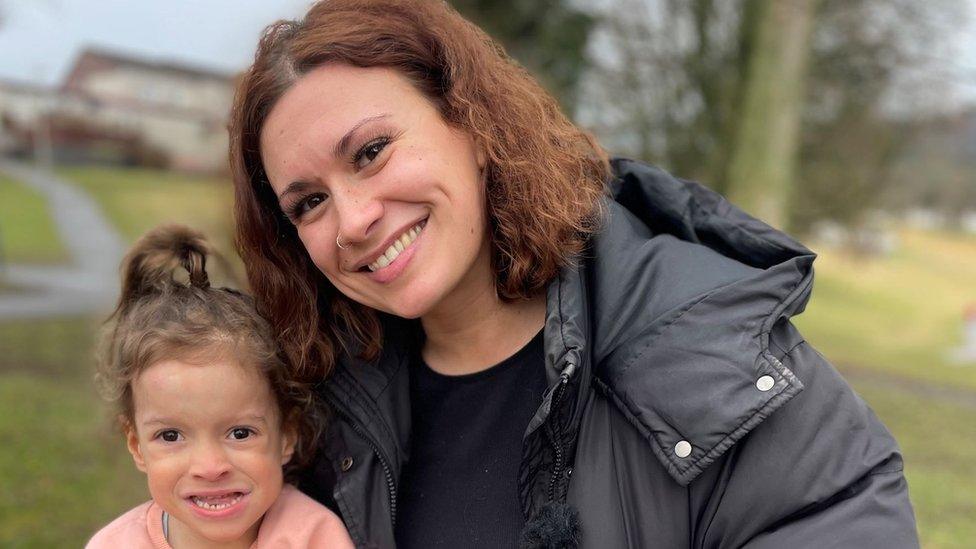One in 10 Scots living in 'very deep poverty'
- Published
- comments

More than 300,000 more people are classed as living in very deep poverty since the last report in March
Half a million people in Scotland are living in "very deep poverty", an anti-poverty charity report has found.
The Joseph Rowntree Foundation (JRT) said poverty for working people was growing and 10% of employees were in locked in persistent low pay.
Women and ethnic minorities were most at risk, and 60% of children in poverty have at least one working parent.
The UK government said it was giving "unprecedented support", and economic growth was the best way to cut poverty.
The charity considered "relative poverty", "very deep poverty" and "in-work poverty" in Scotland.
The latest JRT State of the Nation report , externalsaid more than a million people, including 250,000 children, were living in relative poverty.
This is defined as having a household income after housing costs lower than 60% of the national average (median).
The 490,000 people in very deep poverty account for about one in 10 people in Scotland - an increase of 300,000 since the last report in March.
This is classified as having below 40% of the median household income after housing costs are taken into account.
For a couple with two school age children this is less than £427 per week, external, or £153 for a single person.
The report said there was an increasing trend of "in-work" poverty where there was relative poverty despite a household member being employed.
Almost three-quarters of families in this category had at least one person working in retail, hospitality, health and social work, administrative and support services and/or manufacturing.
Housing costs had a huge impact, with 110,000 people in working families "pulled into poverty due to their housing costs", meaning their income was "enough to escape poverty" but outgoings were excessive.
People from a minority ethnic background experienced a rate of in-work poverty more than triple the rate for white workers, while 70% of those "trapped in persistent low pay" were women, and another 70% were single.
Low pay
Persistent low pay, defined as earning below the real living wage, was found to be a problem, and 72% of those affected were women.
The report said single parents, disabled people and carers often found themselves trapped in low pay.
The real living wage, at £10.90 per hour, is calculated by the Living Wage Foundation, external according to what employees and their families need to live.
The national living wage - currently £10.42 per hour but due to increase to £11 from next April - is the lowest amount workers aged 23 and over can be paid per hour by law.
The JRT said the UK government was "in denial" over the cost of living crisis and that a "work first" approach and changes to Universal Credit had failed to reduce poverty.
It predicted the Scottish Child Payment would help to cut child poverty but warned that "without significant longer term actions planned by the Scottish government, it is difficult to see how the 2030/31 targets can be met under current plans".

Campaigners say many families are forced to rely on food banks
Chris Birt, JRF associate director for Scotland, said decision-makers were sleepwalking towards another "crushing winter".
"The Scottish government can still meet its child poverty reduction targets but it needs to get a move on. While the Scottish Child Payment is providing crucial support to families and starting to drive poverty down again, it isn't enough," he said.
"A major reason for that is the failure of work to be a reliable route out of poverty, particularly for women. Some of our biggest industries are trapping people in low pay, unreliable hours and underemployment.
"There are things governments can, and should do, but businesses need to engage with their workforces to ensure that employees are able to secure an income that supports them to get by."
Economic growth
A spokesperson for the UK government said it had lifted the living wage by "record levels".
"The government's priorities are clear - the best way to help people in Scotland and across the United Kingdom with the cost of living is by driving down inflation and growing our economy," they said.
"We have also provided unprecedented support, recognising the challenges families are facing with the cost of living, providing an average of £3,300 per household while also increasing benefits in line with inflation and lifting the living wage by record levels."
Shirley-Anne Somerville, Scotland's social justice secretary, said the Scottish government was investing £3bn in policies aimed at tackling poverty.
"Tackling poverty and protecting people from harm is one of three critical missions for the government," she said.
"We know poverty doesn't affect everyone equally and that is why we continue to have a particular focus on supporting women, disabled people, racialised minorities, and children from our six priority family groups."
She added that since the end of June, 316,000 children had benefited from £25 per week from the Scottish Child Payment.
A total of £83.7m in Discretionary Housing Payments had been given out and the wages of 100,000 social care and childcare staff would rise to £12 per hour from April 2024, she added.


"Getting people into work" tends to get a lot of attention.
It removes those people from dependence on benefits, saving governments money. And in much political rhetoric, it's given a moral dimension, or is seen to provide dignity.
But if that is the target, it skews resources towards getting people over that employment line, and stopping there. With the mantra of progression ABC - Any job, Better job, Career - the emphasis is on 'A'.
What the Joseph Rowntree Foundation is highlighting are the parts which get less attention - getting above a poverty level of in-work income, and making progress to higher pay still.
Sometimes that comes with more responsibility, though one problem in the jobs market is that the rewards for management roles are not good, especially if they mean a shift from hourly pay to a salary.
The report also offers insights into the groups being left behind. The biggest such group is female and often part-timers. The JRF has identified a 32% gender pay gap between full-time males and part-time women.
Among others facing most discrimination are people with disabilities and from ethnic minorities, larger families and single parents.
None of this is solved simply. But it can be solved by moving on several fronts, according to the JRF, as it lays down a challenge to business to think harder about recruitment, pay, conditions and progression.
The Scottish government is urged to do more than publish reports about fair work, and to improve in-work training and progression support: the UK government to raise the statutory minimum wage, with better childcare and parental pay.
Related topics
- Published5 September 2023

- Published23 March 2023
